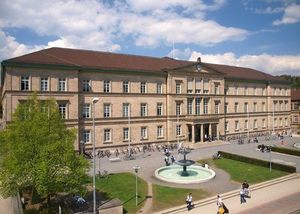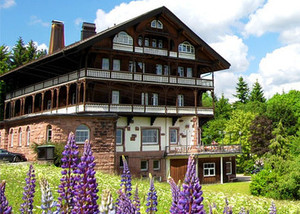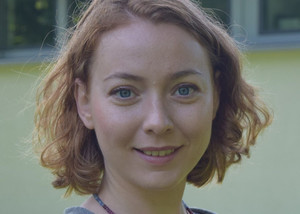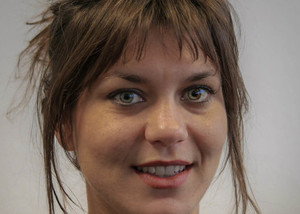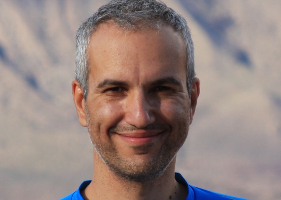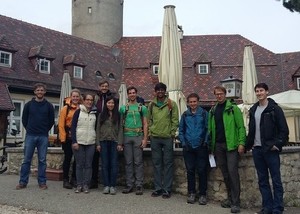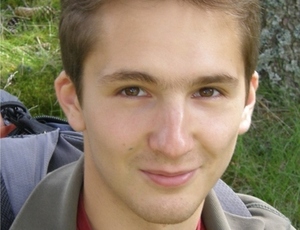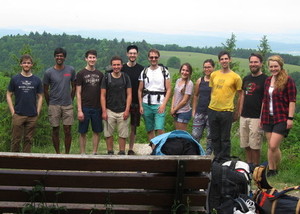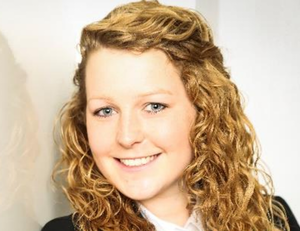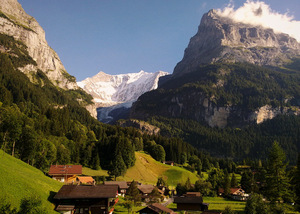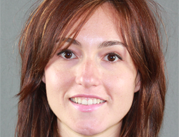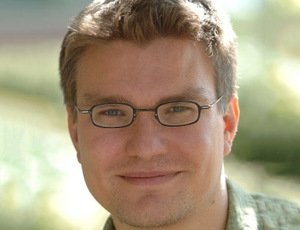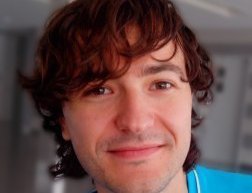Autonomous Vision
Event
28-09-2020
- 01-10-2020
German Conference on Pattern Recognition DAGM-GCPR 2020 in Tübingen
The 42nd German Conference on Pattern Recognition (DAGM-GCPR 2020), the 25th International Symposium on Vision, Modeling and Visualization (VMV 2020) and the 10th Eurographics Workshop on Visual Computing for Biology and Medicine (VCBM 2020) will for the first time be co-located in Tübingen this year!
Andreas Geiger
Autonomous Vision
Event
30-06-2019
- 07-07-2019
3rd Computational Vision Summer School
The 3rd Computational Vision Summer School offers a broad perspective on biological vision and computer vision with a thorough understanding of the theoretical and computational challenges involved. The school is unique in bringing together people from diverse disciplines who all share a computational view of vision. The faculty consists of renowned senior researchers in the field, teaching lectures and providing hands-on tutorials on topics ranging from early vision to image understanding.
Michael Black
Andreas Geiger
Siyu Tang
Autonomous Vision
Talk
Prof. Dr. Björn Ommer
14-12-2018
Self-Supervised Representation Learning for Visual Behavior Analysis and Synthesis
Understanding objects and their behavior from images and videos is a difficult inverse problem. It requires learning a metric in image space that reflects object relations in real world. This metric learning problem calls for large volumes of training data. While images and videos are easily available, labels are not, thus motivating self-supervised metric and representation learning. Furthermore, I will present a widely applicable strategy based on deep reinforcement learning to improve the surrogate tasks underlying self-supervision. Thereafter, the talk will cover the learning of disenta...
Joel Janai
Autonomous Vision
Talk
Zeynep Akata
06-07-2018
Representing and Explaining Novel Concepts With Minimal Supervision
Clearly explaining a rationale for a classification decision to an end-user can be as important as the decision itself. Existing approaches for deep visual recognition are generally opaque and do not output any justification text; contemporary vision-language models can describe image content but fail to take into account class-discriminative image aspects which justify visual predictions. In this talk, I will present my past and current work on Zero-Shot Learning, Vision and Language for Generative Modeling and Explainable Artificial Intelligence in that (1) how we can generalize the image...
Andreas Geiger
Autonomous Vision
Talk
Vagia Tsiminaki
15-12-2017
Appearance Modeling for 4D Multi-view Representations
The emergence of multi-view capture systems has yield a tremendous amount of video sequences. The task of capturing spatio-temporal models from real world imagery (4D modeling) should arguably benefit from this enormous visual information. In order to achieve highly realistic representations both geometry and appearance need to be modeled in high precision. Yet, even with the great progress of the geometric modeling, the appearance aspect has not been fully explored and visual quality can still be improved.
I will explain how we can optimally exploit the redundant visual information of ...
Despoina Paschalidou
Autonomous Vision
Talk
Christoph Mayer
17-11-2017
Operator splitting: a versatile framework for variational image processing tasks.
Variational image processing translates image processing tasks into optimisation problems.
The practical success of this approach depends on the type of optimisation problem and on the properties of the ensuing algorithm. A recent breakthrough was to realise that old first-order optimisation algorithms based on operator splitting are particularly suited for modern data analysis problems. Operator splitting techniques decouple complex optimisation problems into many smaller and simpler sub-problems.
In this talk I will revise the variational segmentation problem and a common family of al...
Benjamin Coors
Autonomous Vision
Talk
Michiel Vlaminck
20-10-2017
3D lidar mapping: an accurate and performant approach
In my talk I will present my work regarding 3D mapping using lidar scanners. I will give an overview of the SLAM problem and its main challenges: robustness, accuracy and processing speed. Regarding robustness and accuracy, we investigate a better point cloud representation based on resampling and surface reconstruction. Moreover, we demonstrate how it can be incorporated in an ICP-based scan matching technique. Finally, we elaborate on globally consistent mapping using loop closures. Regarding processing speed, we propose the integration of our scan matching in a multi-resolution scheme an...
Simon Donne
Autonomous Vision
Talk
Slobodan Ilic and Mira Slavcheva
19-10-2017
SDF-2-SDF: 3D Reconstruction of Rigid and Deformable Objects from RGB-D Videos
In this talk we will address the problem of 3D reconstruction of rigid and deformable objects from a single depth video stream. Traditional 3D registration techniques, such as ICP and its variants, are wide-spread and effective, but sensitive to initialization and noise due to the underlying correspondence estimation procedure. Therefore, we have developed SDF-2-SDF, a dense, correspondence-free method which aligns a pair of implicit representations of scene geometry, e.g. signed distance fields, by minimizing their direct voxel-wise difference. In its rigid variant, we apply it for static ...
Fatma Güney
Autonomous Vision
Talk
Matteo Poggi
12-07-2017
Deep Learning for stereo matching and related tasks
Recently, deep learning proved to be successful also on low level vision tasks such as stereo matching. Another recent trend in this latter field is represented by confidence measures, with increasing effectiveness when coupled with random forest classifiers or CNNs. Despite their excellent accuracy in outliers detection, few other applications rely on them.
In the first part of the talk, we'll take a look at the latest proposal in terms of confidence measures for stereo matching, as well as at some novel methodologies exploiting these very accurate cues.
In the second part, we'll talk ab...
Yiyi Liao
Autonomous Vision
Talk
Matthias Niessner
14-06-2017
Reconstructing and Understanding 3D Indoor Environments
In the recent years, commodity 3D sensors have become easily and widely available. These advances in sensing technology have spawned significant interest in using captured 3D data for mapping and semantic understanding of 3D environments. In this talk, I will give an overview of our latest research in the context of 3D reconstruction of indoor environments. I will further talk about the use of 3D data in the context of modern machine learning techniques. Specifically, I will highlight the importance of training data, and how can we efficiently obtain labeled and self-supervised ground truth...
Despoina Paschalidou
Autonomous Vision
Talk
Alexey Dosovitskiy
06-06-2017
Learning to see and act in dynamic three-dimensional environments
Our world is dynamic and three-dimensional. Understanding the 3D layout of scenes and the motion of objects is crucial for successfully operating in such an environment. I will talk about two lines of recent research in this direction. One is on end-to-end learning of motion and 3D structure: optical flow estimation, binocular and monocular stereo, direct generation of large volumes with convolutional networks. The other is on sensorimotor control in immersive three-dimensional environments, learned from experience or from demonstration.
Lars Mescheder
Aseem Behl
Autonomous Vision
Talk
Carolin Schmitt
11-05-2017
Biquadratic Forms and Semi-Definite Relaxations
I'll present my master thesis "Biquadratic Forms and Semi-Definite Relaxations".
It is about biquadratic optimization programs (which are NP-hard generally) and examines a condition under which there exists an algorithm that finds a solution to every instance of the problem in polynomial time. I'll present a counterexample for which this is not possible generally and face the question of what happens if further knowledge about the variables over which we optimise is applied.
Fatma Güney
Autonomous Vision
Talk
Laura Leal-Taixé
08-12-2016
Deep Learning and its Relationship with Time
In this talk I am going to present the work we have been doing at the Computer Vision Lab of the Technical University of Munich which started as an attempt to better deal with videos (and therefore the time domain) within neural network architectures.
Joel Janai
Autonomous Vision
Talk
Carsten Rother
21-11-2016
A Collection of Recent Work: From 6D Pose estimation via MRF-Diversity to zebrafish detection
In this talk I will present the portfolio of work we conduct in our lab. Herby, I will present three recent body of work in more detail. This is firstly our work on learning 6D Object Pose estimation and Camera localizing from RGB or RGBD images. I will show that by utilizing the concepts of uncertainty and learning to score hypothesis, we can improve the state of the art. Secondly, I will present a new approach for inferring multiple diverse labeling in a graphical model. Besides guarantees of an exact solution, our method is also faster than existing techniques. Finally, I will present a ...
Aseem Behl
Autonomous Vision
Talk
Bogdan Savchynskyy
21-11-2016
Future of graphical models: more modeling power, parallelization, scalable solvers
We propose a new computational framework for combinatorial problems arising in machine learning and computer vision. This framework is a special case of Lagrangean (dual) decomposition, but allows for efficient dual ascent (message passing) optimization. In a sense, one can understand both the framework and the optimization technique as a generalization of those for standard undirected graphical models (conditional random fields). We will make an overview of our recent results and plans for the nearest future.
Aseem Behl
Autonomous Vision
Talk
Anton Milan
22-07-2016
Bipartite Matching and Multi-target Tracking
Matching between two sets arises in various areas in computer vision, such as feature point matching for 3D reconstruction, person re-identification for surveillance or data association for multi-target tracking. Most previous work focused either on designing suitable features and matching cost functions, or on developing faster and more accurate solvers for quadratic or higher-order problems. In the first part of my talk, I will present a strategy for improving state-of-the-art solutions by efficiently computing the marginals of the joint matching probability. The second part of my talk wi...
